Wage theft plagues L.A. garment workers. Why aren’t fashion retailers held responsible?
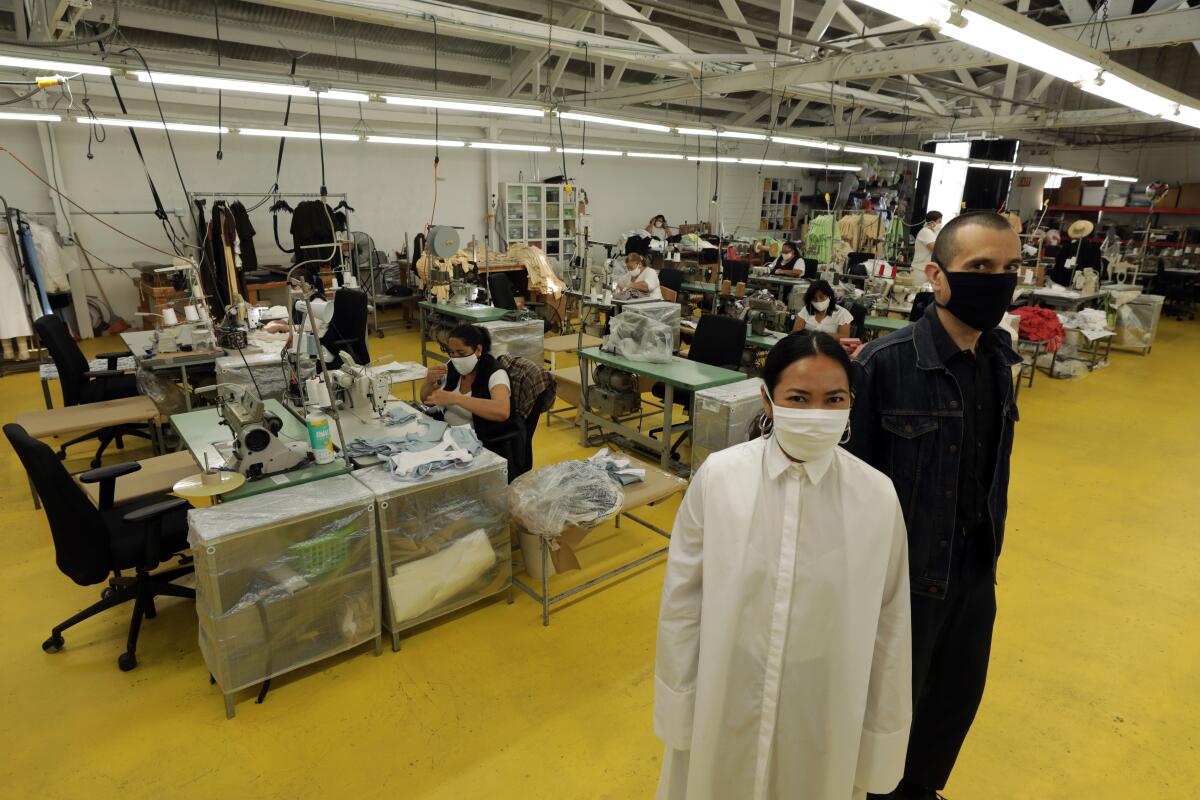
- Share via
The prices are hard to believe: $24.99 for an on-trend dress, delivered to your door; $9.99 for a silky camisole hanging from the rack at a discount chain.
But someone has to pay the real cost of those cheap clothes even if it’s not the American consumer, say labor advocates — who point to the thousands of immigrant workers who can sometimes toil for far less than the minimum wage in small Los Angeles apparel factories.
Now, those advocates are proposing the industry’s biggest reforms in a generation, legislation that would turn the traditional pay structure on its head while holding online shops such as Fashion Nova and other retailers including Nordstrom responsible for any wage theft that occurs in the making of their apparel.
“If your clothes are being produced in an unlawful condition, you are going to share responsibility, period,” said Dana Hadl, a directing attorney at Bet Tzedek, a Los Angeles nonprofit that provides free legal counsel to workers and drafted the legislation.
The bill, SB 1399, is so far-reaching that it’s being labeled by critics as an existential threat to what remains of the region’s once-booming apparel industry, which has shrunk to roughly 45,000 workers after decades of competition from cheap foreign labor. More than a dozen business groups have lined up against it, including the industry’s trade association, the California Chamber of Commerce and the California Retailers Assn.
Opposition, though, is not uniform as some high-profile L.A.-area companies are backing the bill, including Reformation, which markets eco-friendly women’s wear and has a celebrity clientele, and Fashion Nova, the popular fast-fashion retailer, which has been accused of turning a blind eye to wage theft but recently announced changes to its contracting practices.
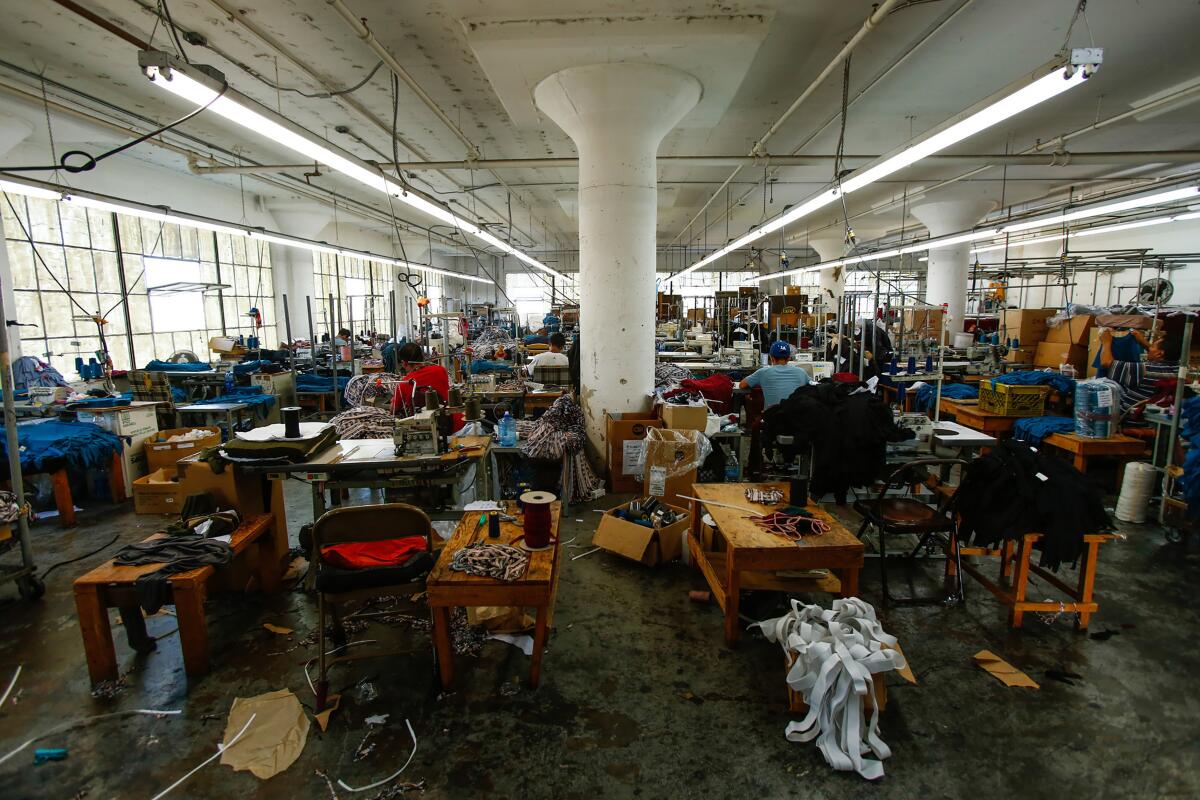
The proposed reforms follow those enacted in 1999, four years after 72 undocumented Thai workers were found virtually enslaved in an El Monte apartment complex, stitching together clothing behind barbed wire. That legislation made garment manufacturers liable for wage violations by the contractors who cut, sew and otherwise produce their garments.
But in the decades since, worker advocates say that some fashion brands and retailers that carry their own clothing lines have found ways to skirt the law by employing layers of subcontracting between them and the small factories that actually produce apparel. Random inspections of 77 garment shops conducted in 2015 and 2016 by the U.S. Department of Labor’s Wage and Hour Division found wage violations at 85% of them. Advocates say the situation hasn’t gotten any better, with many undocumented Latino immigrants afraid to file wage claims over fears of deportation.
A 2016 state law, which applied to multiple fields, tightened up regulations on piece-rate compensation, which is traditional in the apparel industry and pays workers for every hem, seam and cuff they sew. That law mandated paid rest and recovery time and required more detailed payroll records.
The piece rate can allow skilled workers to well exceed the minimum wage, but labor advocates say the rates are often set so low that apparel workers can make less than $5 an hour — even though employers are supposed to make up the difference and pay the legal minimum in such instances. SB 1399, which has passed the Senate and is expected to be heard by the Assembly Appropriations Committee this week, would require employers to pay an hourly wage and only allows piece-rate compensation as an incentive bonus, unless provided for in a collective bargaining agreement.
The combination of creating more stringent liability for wage theft and banning the piece rate has opponents saying the reforms will finish off much of what is left of L.A.’s apparel industry, which once employed some 150,000 workers before liberalized trade with Mexico, Central America and Asia sent clothing assembly out of the country.
“This is a huge overhaul of the entire industry,” said Jennifer Barrera, executive vice president of the California Chamber of Commerce, which has labeled the bill a “job killer,” though she acknowledged there was “no question” labor abuses occur in the industry. “You incentivize companies to basically say, ‘I am not going to contract anymore in California. I can go elsewhere and not be exposed to this type of litigation.’”
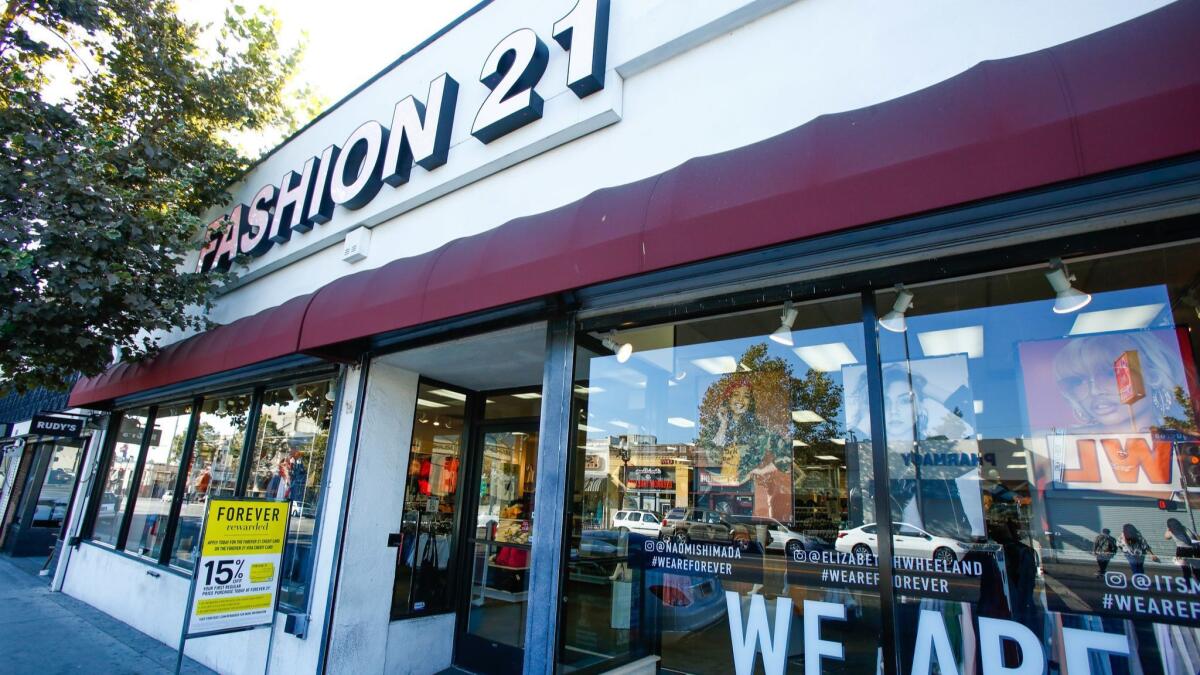
Labor advocates say the rise of fast-fashion retailers such as Forever 21 has contributed to the problem. The L.A. company had been the poster child for alleged wage abuses before it faltered and filed for bankruptcy last year. The Los Angeles Times documented in 2017 how the company had been cited in nearly 300 claims since 2007 by workers demanding back pay for producing its clothing, yet Forever 21 had not paid anything because it was classified as a retailer.
More recently, labor advocates have been critical of Fashion Nova, one of the local industry’s rising stars — and were stunned to hear it had decided to support the proposed reforms. The largely online retailer has skyrocketed to prominence on its $22.99 skin-tight jumpsuits, $19.99 tops and other affordable apparel embraced by a legion of Instagram influencers. It’s also partnered with celebrities such as rapper Cardi B on clothing lines.
The company’s business model relies on rapidly churning out apparel that may be in style for only a short time. That favors making clothes locally even if production costs might be higher than overseas — but critics charge that has led to abuses given the low price tags. An expose in the New York Times in December alleged wage theft at small subcontractors that was similar to what workers suffered making clothes for Forever 21.
Opponents contend the two companies are outliers and do not represent the practices of the L.A. apparel industry, where the use of subcontractors to assemble apparel has long been standard. They are calling for better enforcement of existing laws.
“This new law is all-encompassing, and it paints the whole industry as a bad apple — that is my problem. We are not all Fashion Nova and Forever 21,” said Ilse Metchek, president of the California Fashion Assn. trade group, who fears big chains such as Nordstrom and other retailers will stop contracting for apparel in the state. “You are picking the worst of the worst.”
Fashion Nova declined to comment on Metchek’s remarks but has announced reforms of its contracting practices. That includes a mandate that its contractors and subcontractors agree to random independent audits and that their workers are paid the applicable minimum wage, which in Los Angeles rises to $15 an hour for employers of all size next July.
It is also establishing a toll-free hotline for workers to report abuses and has instituted an escalating system of penalties for violators of its agreements. The company said it recently suspended 10 vendors that refused to submit to third-party audits. Fashion Nova would not comment on what percentage of its clothing it continues to make in Los Angeles, but it did say it continues to work with more than 50 local vendors.
“Fashion Nova continues to support the various steps taken by government agencies and factories towards improving working conditions for garment workers, including the latest legislation proposed with SB 1399,” the company said in a statement to The Times.
Surprised labor advocates speculate the company wants to avoid more negative publicity but applauded the decision and called on other apparel makers to join it. “We’re certain both business and workers can thrive under SB 1399,” the sponsors said in a statement.
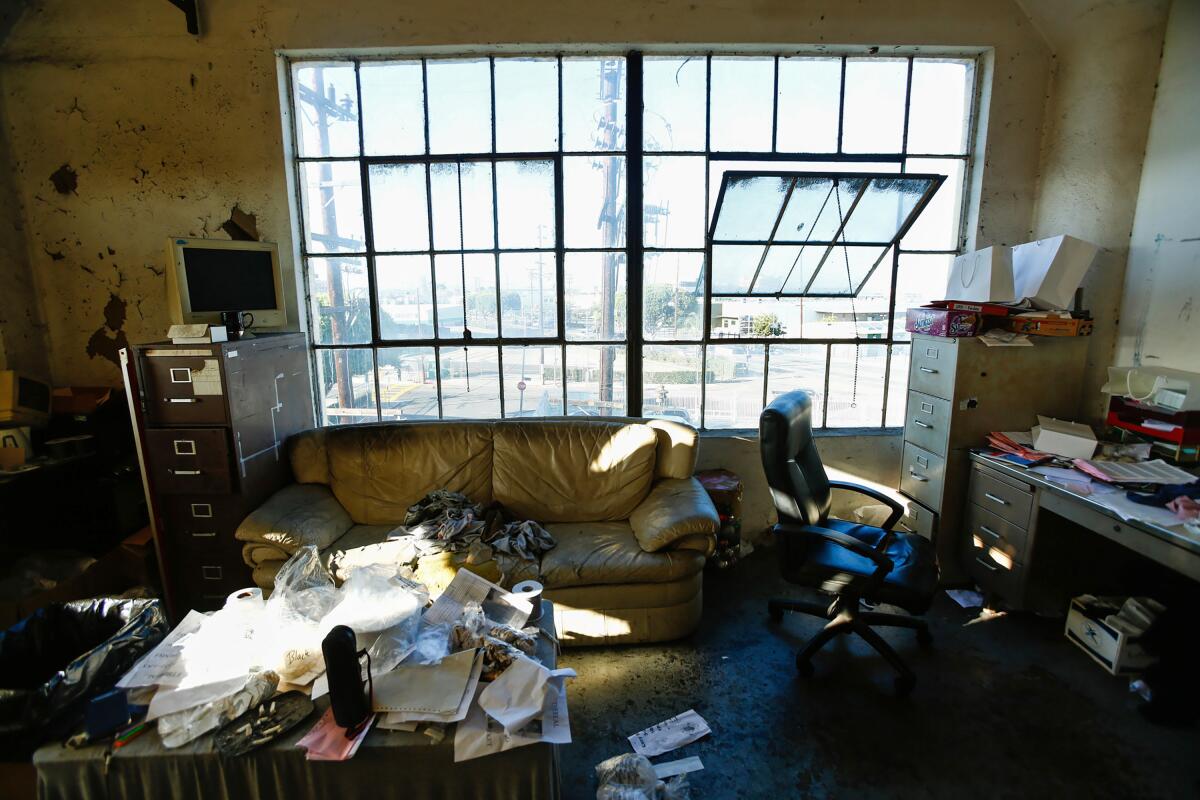
Worker advocates maintain that wage theft goes beyond a handful of retailers and is common in the industry, and the new reforms would fix shortcomings in the original 1999 legislation that have allowed some apparel makers to evade it.
“We would not have clamoring by these garment workers who say the piece rate is used to exploit them if in fact they were making much more money,” said the bill’s author, state Sen. Maria Elena Durazo (D-Los Angeles), who heard workers’ testimony last year chairing an oversight hearing on a wage-restitution fund for apparel workers.
The hearing prompted her to seek proposed reforms from worker advocates, which were distilled into the bill. SB 1399 creates a new category of companies called “brand guarantors” that would be “jointly and severally” liable for any wage theft in the production of clothing. That would make retailers that contract to have clothing made for them responsible for a wage violation even if it was committed by an apparel shop hired by its manufacturing contractor, something advocates say is very difficult to do now and relatively rare.
Critics say that joint liability for third-party violations would make “any person or entity in the clothing industry” liable, including dry cleaners, personal shoppers and secondhand retailers, according to a letter of opposition by the California Chamber of Commerce signed by 18 other groups.
Hadl said the criticisms are wild exaggerations intended to confuse legislators. She said the bill only creates liability for entities that contract to have clothes made in California, such as a retailer that hires apparel companies to produce clothing to its specifications for its private labels.

That provision would capture virtually all the clothing sold at a retailer such as Fashion Nova, advocates say, but only some of the apparel sold by department stores or discount chains that carry myriad merchandise, including outside brands.
“Somebody who buys finished goods who has not had any input into their production is not going to be held liable. Target says, ‘We want to buy 50,000 Nike T-shirts of the L.A. Rams’ — it doesn’t meet the criteria,” Hadl said.
Bill advocates say joint liability is crucial in ensuring there are large entities on the hook able to pay wage claims. It would also encourage brands and retailers to pay more to have their clothes made and step up their monitoring of the region’s small subcontractors, which cut, sew and finish garments and are often owned by Korean immigrants. They say monitoring has fallen off over the years.
“The workers at the bottom are the ones left holding the bag because the most capitalized and the biggest companies are the ones at the top. At the bottom are the direct employers of the workers who are fly-by-night or disappear or are judgment-proof or transfer ownership to the brother or cousin or uncle or whoever,” said Matthew DeCarolis, another Bet Tzedek attorney.
The Garment Worker Center, a bill sponsor that provides services to apparel workers in downtown Los Angeles, has been helping Santa, a 36-year-old undocumented worker, deal with just such a situation. The woman, who asked that her surname not be disclosed because of her immigration status, said she typically worked 65 to 70 hours a week at a factory on East 60th Street in Los Angeles for $300 to $325, less than $5 an hour depending on the week.
Her claim lists three employers at that address, including Chung Dress and its owner Sane Chung. She provided labels in her wage claim indicating she made clothes for Frame, a new upscale lifestyle brand in Culver City, and Good American, a “body positivity” brand co-founded by Khloe Kardashian that sells casual clothing for women of all sizes.
Chung denied to The Times that the woman was the victim of wage theft and said the complaint was retaliation for being laid off when work slowed. He also said she worked not for him but for a third company — a subcontractor he used when Chung Dress had more work than it could handle but that dissolved after the work ran out. It was run by a friend who sublet space. Chung said he had submitted payroll records to the state that back up his innocence.
“I understand there are a lot of employers that, you know, do shady things, that don’t pay well, but what happens to the people like me? I’m fair. I did everything the right way and I still get dinged,” he said.
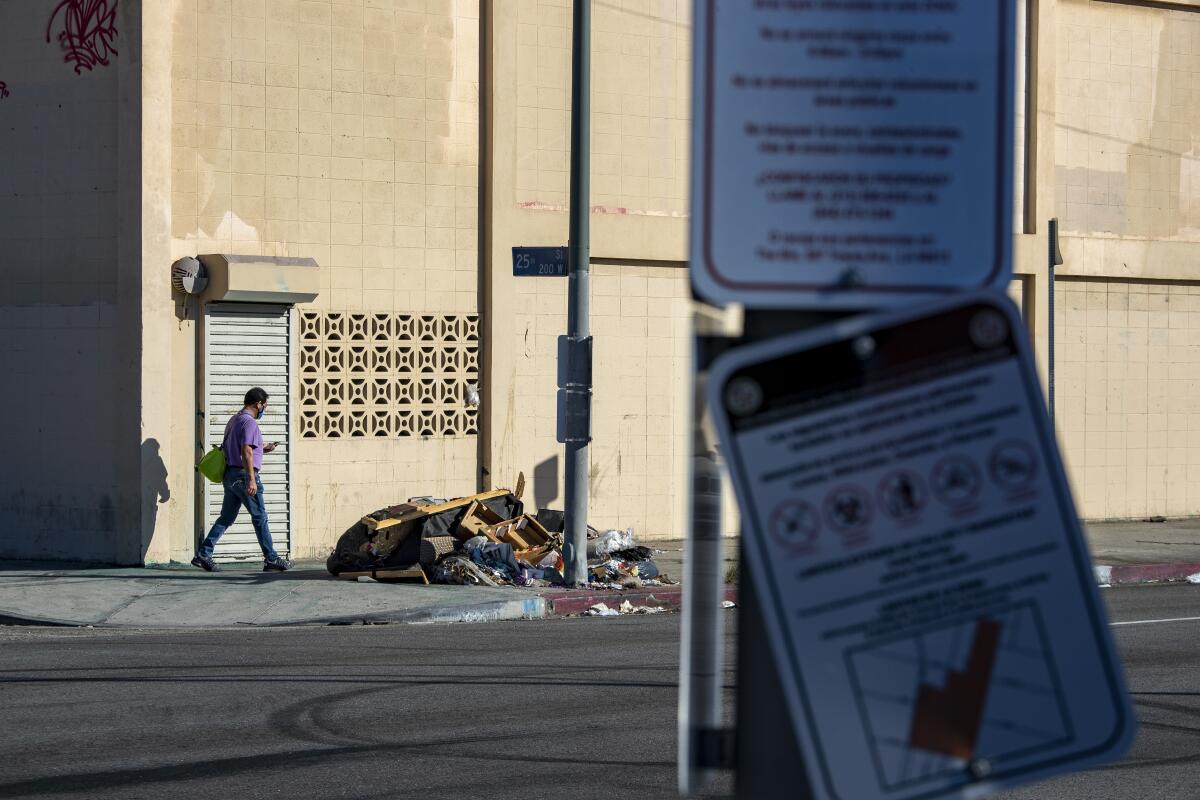
Frame issued a statement that it is “committed to the highest ethical standards” and works “diligently to ensure that each factory we work with complies with these regulations through our agreements.” It also said it had no knowledge of the third-party wage claim and could not comment on it. Good American did not respond to repeated emails for comment.
It’s also possible to try to hold retailers liable for wage violations at garment factories by proving that a purchase order was put out at a cost that could not possibly be met without shortchanging workers.
David Weil, who oversaw a federal crackdown on the industry while serving as the administrator of the U.S. Department of Labor’s Wage and Hour Division during the Obama administration, said his agency attempted to do just that toward the end of his term.
“We worked the problem from the ground up. We found out how many minutes it would take to make different items, therefore the wages that would need to be paid for that given some reasonable rate of return and the cost of materials,” he said. “It was a heavy lift.”
The division found contractors received just 73% of the price needed in order to ensure that workers could receive a bare minimum legal wage.
Randy Youngblood, a prominent industry figure who operates Apparel Resources, a Yorba Linda company that monitors contractor compliance for apparel manufacturers, said he supports abolishing the piece rate.
“I am not a proponent of piece rate work in 98% of the garment factories in California. As a time-study engineer, it’s a real science. You need to be on the shop floor checking rates with a stopwatch,” said Youngblood, whose high-end clients include jeans maker Paige and women’s apparel designer Karen Kane.
“If an operator has trouble making the rate, you need to be able to show her where she or he are losing time and how they can pick that time up. The bulk of the sewing contractors we deal with don’t have that level of sophistication,” he said.
Richard Cho, president of the Korean Apparel Manufacturers Assn., which represents hundreds of companies that make clothes for brands and retailers, said an hourly minimum would wipe out the remaining manufacturers that make inexpensive clothes for big discount chains.
“We are not even running small businesses. We are running micro businesses,” he said. Those that could survive it are moving into the “better boutique market,” where higher-quality clothes are sold at a premium.
Still, he doesn’t outright oppose the bill, noting that making retailers responsible for labor violations of subcontractors could help his membership. “Why is it that the [liability] doesn’t go all the way up to the one that has written the bad purchase order? Why does it always have to end with the contractor or the manufacturers?” he said. “That is not fair.”
Nana Atelier, a small manufacturer in Boyle Heights that opened two and a half years ago, was one of the few apparel companies that has sent a letter in support of the bill to legislators.
Co-owners Alnea Farahbella and her husband have their own upscale women’s fashion brand and make clothes for other high-end brands, including New York designer Rachel Comey, in a brightly lit factory with a cheery, yellow floor. She candidly admits the couple’s own brand, Toit Volant, is subsidizing the company, which pays its workers an hourly wage.
That compensation model raises costs, but she believes the company will eventually turn a profit. Farahbella said that as the factory’s reputation has grown, the couple has turned down lowball offers for work.
“We get approached all the time by brands that are selling garments at retail for $400. They are like, ‘We want to pay $20 for this,’” she recounted. “‘You want to pay $20 for your cutting, your sewing, your fabric and you want to sell it for $200 for yourself, and then the retailer will sell it for $400?
“‘You can’t come to us,’” is her reply. “‘We are not desperate.‘”
More to Read
Inside the business of entertainment
The Wide Shot brings you news, analysis and insights on everything from streaming wars to production — and what it all means for the future.
You may occasionally receive promotional content from the Los Angeles Times.











